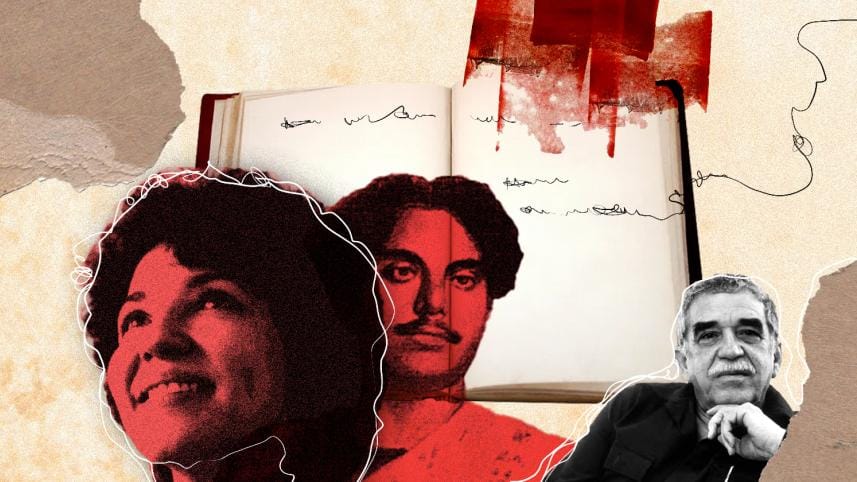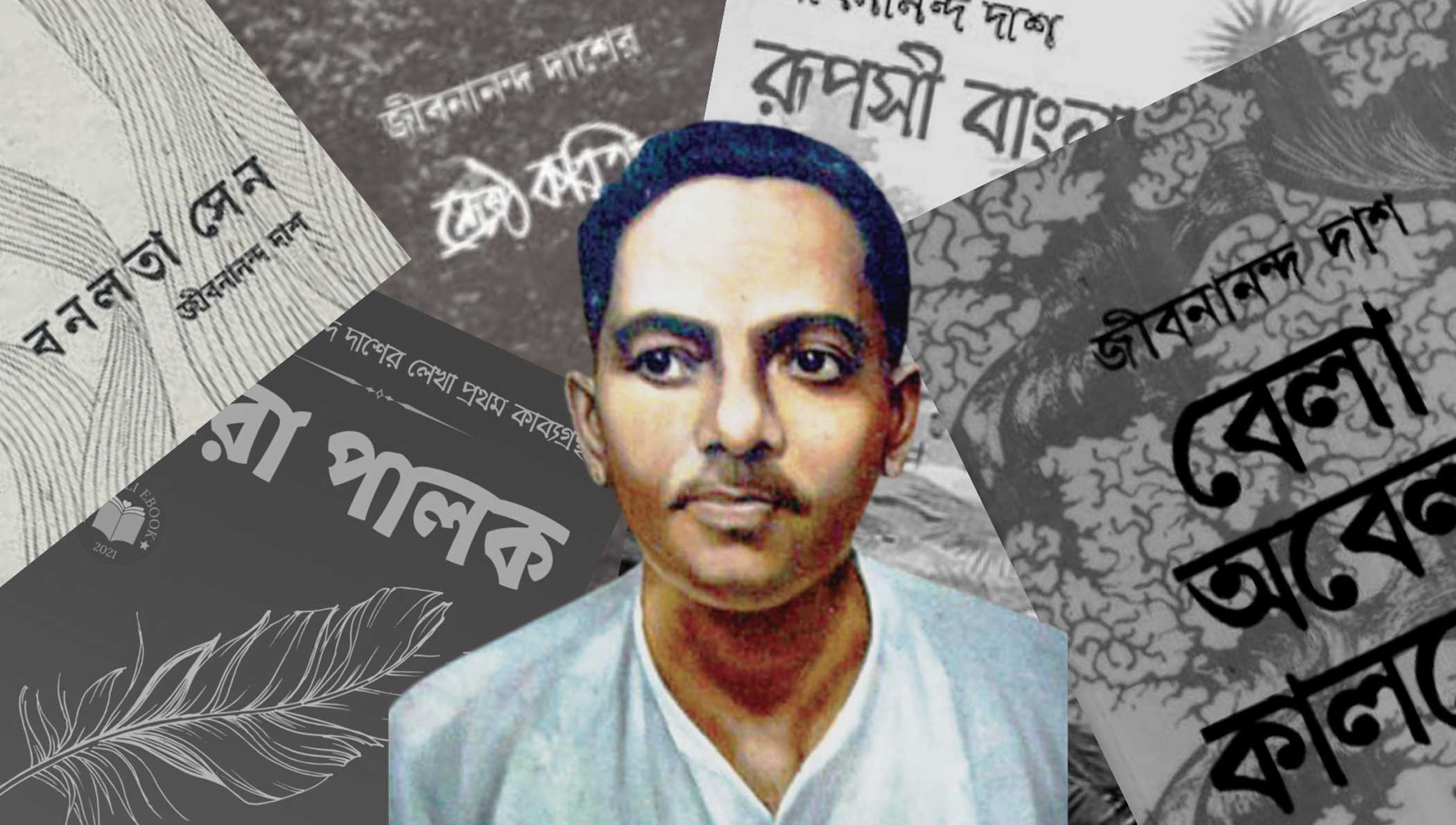Of poetry, philosophy, politics, and praxis

1
To begin with, poetry can never be defined either definitively or adequately. Thus, there cannot but be continuous attempts to define poetry itself. The great 19th-century French poet Paul Valery once observed, "Most people have such a vague idea about poetry that this vague feeling itself is their definition of poetry." But then one can quickly trace its etymology. The word "poetry" is derived from the Greek word poiesis, which means "creating" or "making." Poets are creators. It's not for nothing that the great mediaeval Bangla poet Syed Alaol asserts that poets are God's genuine disciples. Initially, poetry—as old as history—was oral. Poetry and music were then indivisible. But, later, the emergence of print capitalism contributed to their bifurcation, while also yanking poetry from the human body itself. Indeed, the history of poetry is the history of mutations, metamorphoses, and movements as well as experiments and even iconoclasms, ruptures and inaugurations, among other things.
2
But why cannot poetry be concretely defined? One perspective—rooted as it is in a specific Sufi tradition of poetics in the Arab world and South Asia—suggests that in its creative, expressive enactment of sounds, signs, and symbols, poetry offers the thresholds of the impossible, the silences surrounding the unsayable, the nuances of the infinitesimal and the infinite, the truth of the "one plus one equals the One" (as represented by the Sufi poet Mansur Al-Hallaj's famous ecstatic pronouncement of Aanal Haq)—in such a way that poetry ranges beyond the borders and boundaries of definition, comprehension, and even translation. But then, in this instance, the mysterious, the metaphysical, the magical, the musical, even the mathematical, and the poetic intersect and interact to provide a new experience that calls for a new mode of being in the world.
3
Yet, poetry is a concrete signifying and sensuous practice that words the world and worlds the word. But what is the "concrete," after all? As Karl Marx maintains in the Grundrisse, "The concrete is concrete because it is the concentration of many determinations, hence the unity of the diverse." In this sense, then, there are poems in the world—and there are worlds in the poems—that are concrete. And I believe in the worldliness of poetry, always jazzed up by the dialectical dance of imagination, while I also keep thinking of the poetry of worldly things—concrete things. And as I have maintained elsewhere, I think of Pablo Neruda's famous odes to things. I think of how he says, "I love things with a wild passion." I think of how he cherishes tongs and scissors; how he adores cups, hoops, hats—things small and things grand; how he loves dishes, vases, the curves of a shoe, or the glints of eyeglasses. He loves rings, talismans, clocks, compasses, coins, and, of course, the silken plushness of chairs. And he loves wondrous tables, floating ships, even broken staircases. And he loves buttons, cups, knives, shears—the velvety depths of things, or the serene surfaces of things, or the multitude of things crafted by the human hand. The tone, tune, timbre, tenor, and texture of the text in Neruda's poetry also contribute to the creation of beauty—beauty born out of common, ordinary things and of the temperature of language itself.
4
And I'm with the English poet WH Auden when he maintains, "A poet is, before anything else, a person who is passionately in love with language." Indeed, there is no poetry without language. But, then, not every language is poetic. The language of accounting and business and law, for instance, is not necessarily the language of poetry, although a crazy lover like Florentino Ariza in Gabriel García Márquez's novel Love in the Time of Cholera may attempt to make all those languages strangely, even shockingly poetic. It's not for nothing that the Mexican poet Octavio Paz once put it this way, "Poetry is the other way of using language." And this "other way" of using language—like God, like love, like magic, like even money—can do crazy, mysterious things in poetry. One may recall Stéphane Mallarmé—widely regarded as one of the most musical and philosophical of modern poets—for whom the poet seems to be also a sort of magician or alchemist of language. As Mallarmé observes, "Poetry is the expression of the mysterious sense of the aspects of existence by means of human language brought back to its essential rhythm; in this way it endows our everyday life with an authenticity and constitutes the only spiritual task." And our own Mirza Asadullah Khan—the great Ghalib—would at least partly concur with Mallarmé while worlding the spiritual, which, for Ghalib, cannot be divorced from the philosophical as such.
Poetry has use values and (non-capitalist) exchange values. Poetry provides communion, communication, catharsis. Poetry may serve as a vehicle for preserving cultural heritage and histories through its oral and written traditions. And the greatest poetry in the world is love poetry, and love poetry is in turn political poetry, all of which re-creates us. Poetry can even radically train our senses or even radically educate us. Its metaphors can be epistemologically enabling, its images can be sensuously engaging, its rhythms can be even therapeutic.
5
But what is the relationship between poetry and philosophy? I cannot resist recalling the leading French philosopher Alain Badiou's piece "Philosophical Status of the Poem." Badiou here brilliantly meditates on the three possible relations of philosophy—as thought—to the poem. He takes up Parmenides, Plato, and Aristotle. According to Badiou, then, philosophy envies the poem, as in the case of Parmenides; philosophy excludes the poem, as in the case of Plato; and philosophy classifies the poem, as in the case of Aristotle. In other words, the three possible links between poetry and philosophy are "identifying rivalry" (Parmenides), argumentative distance" (Plato), and "aesthetic regionality" (Aristotle). Badiou also takes up the German philosopher Martin Heidegger, maintaining that he has "very legitimately re-established the autonomous function of the thought of the poem," but by Badiou's reckoning, Heidegger in the final instance "has only been able to revert to the judgement of interruption, and to restore, under subtle and varied names, the sacral authority of poetic proffering—and the idea that the authentic lies in the flesh of words." For Badiou, to the extent that poetry is the thought of the presence of the present, poetry is no rival for philosophy. Although poetry and philosophy are not identical, poetry gets philosophical in more ways than one.
6
The Latin American revolutionary poet Roque Dalton's "Ars Poetica" is a poem of three lines: "Poetry/ Forgive me for having helped you understand/ You're not made of words alone." As Claire Gebeyli, a Lebanese writer, puts it, "Of what use is the pen if it forgets to press down on people's chests? If the words it pours forth are mere particles sewn and resewn on the body of language?" On a somewhat different register, the Black feminist poet Audre Lorde underlines the task of a poet as being one "to name the nameless so it can be thought." Dalton, Gebeyli, and Lorde—their different stylistic signatures notwithstanding—converge at least around the idea that poetry is more than "word-making," more than even a clever play of words. Is poetry, then, a kind of world-making? The worlding of the word and the wording of the world, as was indicated earlier? Isn't the poet an Orphic singer who brings things into being for the first time? Isn't poetry also the letting go of language itself? These questions are not merely Heideggerian ones. For me, such questions, among many others, were already prompted by Lalon Fakir's own lyrical theories of the body and language, although they were broached in different contexts.
7
And what, then, is the relationship between poetry and politics? Poetry cannot be reduced to the political. But poetry is inherently political. True, as the Uruguayan poet Mario Benedetti states, "no dictatorship has ever fallen because of a sonnet." But, then, I'm with James Joyce when he ardently asserts, "Poetry, even when apparently most fantastic, is always a revolt against artifice, a revolt, in a sense, against actuality." It's in the Joycean sense that Jibanananda Das's ostensibly aestheticist "Banalata Sen" is a political poem, for its spatial imagination and its new mode of linguistic becoming or being challenge and unsettle the actuality of dominant linguistic "production relations," if you will. But, then, poetry can also be deliberately political. Kazi Nazrul Islam's "Bidrohi" (The Rebel), for instance, is an explicitly, explosively political poem—one that turns out to be an unrelenting revolutionary praxis. Let's also recall what the Puerto Rican revolutionary feminist poet Iris M Zavala has to say, "I can only conceive of poetry as the expression of the shouts in the streets—those that are muffled, that are felt. It is placing your feet firmly on the ground and making the White House, Washington, and Wall Street tremble, and having the tremor reach all the way to Spain. A poem is an immense 'Yes!' to the wretched of the earth." Almost similarly, the Nicaraguan feminist poet Rosario Murrillo asserts, "We make a revolution when we write a poem." And Audre Lorde famously politicises poetry by positing it as even existentially urgent praxis, "For women, then, poetry is not a luxury. It is a vital necessity of our existence. It forms the quality of the light within which we predicate our hopes and dreams toward survival and change, first made into language, then into idea, then into more tangible action."
8
Poetry has use values and (non-capitalist) exchange values. Poetry provides communion, communication, catharsis. Poetry may serve as a vehicle for preserving cultural heritage and histories through its oral and written traditions. And the greatest poetry in the world is love poetry, and love poetry is in turn political poetry, all of which re-creates us. Poetry can even radically train our senses or even radically educate us. Its metaphors can be epistemologically enabling, its images can be sensuously engaging, its rhythms can be even therapeutic. And "being" itself is rhythm. We ourselves are multiple, sliding, travelling rhythms in space and time. When we cease to have rhythm, we are dead. And when we cease to have poetry, we are spiritually dead, one way or another.
Dr Azfar Hussain is director of the graduate programme in social innovation and professor of integrative/interdisciplinary studies at Grand Valley State University in Michigan, US. He is also summer distinguished professor of English and Humanities at the University of Liberal Arts Bangladesh (ULAB) and vice-president of US-based Global Center for Advanced Studies.
Views in this article are the author's own.
Follow The Daily Star Opinion on Facebook for the latest opinions, commentaries and analyses by experts and professionals. To contribute your article or letter to The Daily Star Opinion, see our guidelines for submission.




 For all latest news, follow The Daily Star's Google News channel.
For all latest news, follow The Daily Star's Google News channel. 

Comments